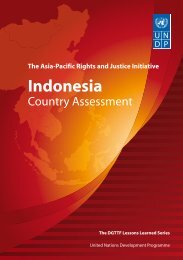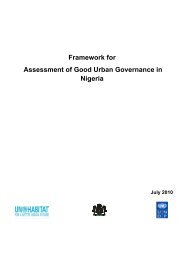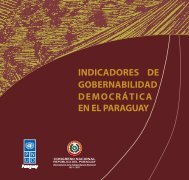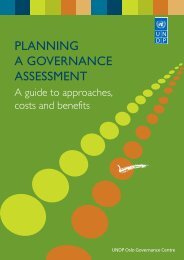A Users' Guide to Measuring Local Governance
A Users' Guide to Measuring Local Governance
A Users' Guide to Measuring Local Governance
You also want an ePaper? Increase the reach of your titles
YUMPU automatically turns print PDFs into web optimized ePapers that Google loves.
1<br />
Assessments of <strong>Local</strong> <strong>Governance</strong><br />
1.1 What is local governance?<br />
<strong>Governance</strong> is about the processes by which<br />
public policy decisions are made and<br />
implemented. It is the result of interactions,<br />
relationships and networks between the different<br />
sec<strong>to</strong>rs (government, public sec<strong>to</strong>r, private sec<strong>to</strong>r<br />
and civil society) and involves decisions,<br />
negotiation, and different power relations<br />
between stakeholders <strong>to</strong> determine who gets<br />
what, when and how. The relationships between<br />
government and different sec<strong>to</strong>rs of society<br />
determine how things are done, and how services<br />
are provided. <strong>Governance</strong> is therefore much more<br />
than government or ‘good government’ and<br />
shapes the way a service or set of services are<br />
planned, managed and regulated within a set of<br />
political social and economic systems.<br />
In the last decade, the concept of ‘democratic local<br />
governance’ has become an integral part of local<br />
development approaches, and has provided a<br />
basic rationale for donors’ support <strong>to</strong><br />
decentralization reforms and local governments’<br />
capacity building. The very concept of ‘good<br />
governance’ at local levels denotes quality,<br />
effectiveness and efficiency of local administration<br />
and public service delivery; the quality of local<br />
public policy and decision-making procedures,<br />
their inclusiveness, their transparency, and their<br />
accountability; and the manner in which power<br />
and authority are exercised at the local level.<br />
While local government is the essential<br />
institutional building block for local governance,<br />
the wider governance sphere comprises a set of<br />
state and non-state institutions, mechanisms and<br />
processes, through which public goods and<br />
services are delivered <strong>to</strong> citizens and through<br />
which citizens can articulate their interests and<br />
needs, mediate their differences and exercise their<br />
rights and obligations.<br />
The concepts of local governance and<br />
decentralization, at times used interchangeably,<br />
are related but different concepts. Decentralization<br />
is primarily a national political, legislative,<br />
institutional and fiscal process. While local<br />
governance can be affected by decentralization<br />
processes - for example, if local governments are<br />
expected <strong>to</strong> provide services formerly offered<br />
through national organisations - it may or may or<br />
may not be accompanied by decentralization,<br />
representative or participa<strong>to</strong>ry democratic<br />
processes, transparency, accountability or other<br />
defining characteristics of ‘good’ local governance.<br />
<strong>Local</strong> governance and decentralization evolve in a<br />
constantly shifting political and social context.<br />
Holistic methods of analysis—such as the open<br />
systems approach - can yield a sense of how many<br />
different elements interact and affect each other.<br />
This approach entails prioritizing political analysis;<br />
drawing connections across different aspects of<br />
local governance and decentralization, as well as <strong>to</strong><br />
related political and public reform processes; and<br />
encouraging coordinated action by development<br />
partners. 3<br />
UNDP has a holistic approach <strong>to</strong> defining the field<br />
of local governance and decentralisation by using<br />
the concept of decentralized governance for<br />
development. 4 Decentralized governance is not a<br />
panacea or a quick fix. The key <strong>to</strong> human<br />
development-friendly decentralized governance is<br />
<strong>to</strong> ensure that the voices and concerns of the poor,<br />
especially women, help guide its design,<br />
implementation and moni<strong>to</strong>ring.” 5<br />
3<br />
“A <strong>Guide</strong> <strong>to</strong> <strong>Local</strong> <strong>Governance</strong> and Decentralization: Programme Experiences and Strategies from a UNDP E-Discussion”, UNDP<br />
(draft 2008)<br />
4<br />
“Decentralized <strong>Governance</strong> for Development – A Combined Practice Note on Decentralization, <strong>Local</strong> <strong>Governance</strong> and Urban/Rural<br />
Development”, UNDP, 2004<br />
5<br />
““Decentralized <strong>Governance</strong> for Development – A Combined Practice Note on Decentralization, <strong>Local</strong> <strong>Governance</strong> and Urban/Rural<br />
Development”, UNDP, 2004<br />
A Users’ <strong>Guide</strong> <strong>to</strong> <strong>Measuring</strong> <strong>Local</strong> <strong>Governance</strong> 5




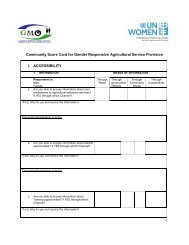

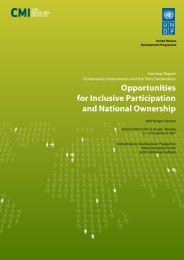
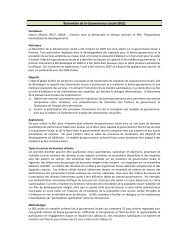
![GuÃa del Usuario ] - Governance Assessment Portal](https://img.yumpu.com/44740603/1/190x253/gua-a-del-usuario-governance-assessment-portal.jpg?quality=85)
